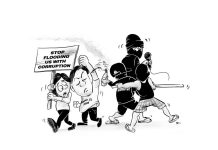
IN ILOILO, as in the rest of the country, corruption has ceased to be an abstract buzzword reserved for speeches, investigations, or political campaigns. It is no longer just a scandal debated in the halls of Congress or whispered about in cafés. It has become a gut issue — one that is felt viscerally in the stomachs of the poor, in the classrooms of students, in the tax bills of workers, and in the struggles of families who cannot afford medicine.
The recent “Trillion Peso March” in Iloilo was a vivid proof to this reality. It brought together fisherfolk, teachers, students, religious leaders, women’s groups, and even current and former public officials, all declaring in one voice that corruption has seeped into every facet of daily life. When a fisherman from northern Iloilo says he is hounded for minor violations while politicians who steal billions go unpunished, that is corruption made flesh. When a student leader laments that resources meant for the youth’s future are siphoned into private pockets, that is corruption robbing the next generation.
Teachers too know this truth intimately. As they spoke, they laid bare how classrooms remain overcrowded, how learning materials remain scarce, and how budget cuts plague state universities — all because money that should have gone to education was misused or outright stolen. For them, corruption is not an abstract loss of funds; it is the daily frustration of trying to teach in broken systems starved of support.
Ordinary taxpayers feel the betrayal as well. A middle-class worker put it bluntly: taxes rise, yet services decline, while officials live lavishly. That disconnect between sacrifice and return erodes trust in government, pushing the middle class — long the backbone of the economy — closer to despair and disillusionment.
And for women and faith leaders, the anguish is moral as much as material. They see hospitals without medicine while billions are diverted elsewhere. They see poverty deepen while the corrupt grow richer. Their cry is not just for accountability but for justice, for dignity, and for moral reckoning.
This is why corruption can no longer be dismissed as merely a “political problem.” It is a lived experience. It is felt in empty stomachs, in crumbling classrooms, in unfair fishing bans, in higher taxes, in overburdened hospitals. It goes beyond missing billions; it is about stolen futures.
The Iloilo protest is a microcosm of a national truth: when corruption becomes a gut issue, silence is no longer an option. The voices raised in Jaro Plaza and carried to the Iloilo Provincial Capitol must not be ignored. They represent not just indignation but survival, not just anger but the collective demand for change.
Corruption is not abstract. It is as real as hunger, as real as overcrowded classrooms, as real as a sick child denied medicine. Until it is confronted with transparency, accountability, and political will, the people will continue to take to the streets — because corruption is not merely politics. It is life itself.







